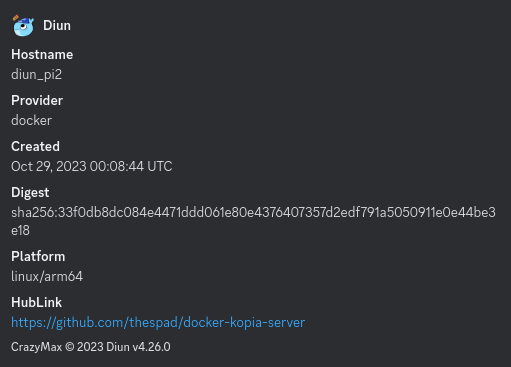Introduction
One of the most common questions around Docker is “how do I know when a new version of an image gets published?”. Even if you’re tied to a specific version tag, rather than latest, security and bug fixes can still result in new images being pushed and there’s no built-in mechanism to notify you that it’s happened.
There are a few automated update tools available; Watchtower and Ouroboros being the most common, but they’re primarily designed to handle the whole process from update check, to download, to container recreation, and that’s…risky. There might be stuff that you want to always be on the bleeding edge, but most of the time you’d prefer to wait a bit and make sure there’s nothing that’s going to cripple your containers before you pull the trigger. This is where Diun comes in; a Docker Image Update Notifier, it does what it says on the tin. Diun can monitor your containers and send alerts when a new image is published; you can even have it monitor additional image tags that you’re not currently using but want to keep track of.
Using Diun
Let’s go over a quick Compose example and see what we’re dealing with
version: "2.4"
services:
diun:
image: ghcr.io/crazymax/diun:latest
container_name: diun
hostname: diun_dockerhost1
volumes:
- ./data:/data
- /var/run/docker.sock:/var/run/docker.sock:ro
environment:
- TZ=Europe/London
- LOG_LEVEL=info
- DIUN_DB_PATH=/data/diun.db
- DIUN_WATCH_WORKERS=10
- DIUN_WATCH_SCHEDULE=0 * * * *
- DIUN_WATCH_FIRSTCHECKNOTIF=false
- DIUN_PROVIDERS_DOCKER_WATCHBYDEFAULT=false
- DIUN_NOTIF_TELEGRAM_TOKEN=${TGRAMAPI}
- DIUN_NOTIF_TELEGRAM_CHATIDS=${TGRAMCHAT}
restart: unless-stopped
labels:
- diun.enable=true
There are a couple of things to note here, first of all Diun needs access to your Docker socket to be able to enumerate the other containers. As the container is not exposed externally this is a low risk, but if you’re really concered take a look at a socket proxy like this and use the DIUN_PROVIDERS_DOCKER_ENDPOINT environment variable to set the endpoint location.
Secondly, you’ll notice that I’ve set the container hostname. This isn’t mandatory but if you’ve got more than one box with Diun on you’ll probably struggle to work out which is sending you notifications if you’re relying on randomly generated hostnames.
Configuration
Diun can be configured via YAML config file or environment variables, here I’m using the latter.
- DIUN_DB_PATH=/data/diun.db
- DIUN_WATCH_WORKERS=10
- DIUN_WATCH_SCHEDULE=0 * * * *
- DIUN_WATCH_FIRSTCHECKNOTIF=false
There shouldn’t be any reason to move the database path or change the name, but you can. Equally you probably don’t need to change the number of parallel workers unless you have a ton of containers or a rate-limited registry. The default schedule is hourly, which is broadly fine, but with Dockerhub’s impending pull limits I’ve moved mine to 6-hourly (0 */6 * * *) - how often are new images being released anyway? If like me you’re hopeless at cron syntax then this site is extremely useful. Finally Diun can send you a notification every time it starts monitoring a new image, but that can get noisy fast. May be helpful if multiple people are managing your environment and you want to keep track of what’s been added.
If you don’t include these variables they’ll use their default values, as above.
- DIUN_PROVIDERS_DOCKER_WATCHBYDEFAULT=false
Each provider (docker, file, kubernetes, swarm) has its own provider options. In this case we don’t want Diun to watch every container by default, only those we tell it to. This is achieved using labels, which we’ll get to.
- DIUN_NOTIF_TELEGRAM_TOKEN=${TGRAMAPI}
- DIUN_NOTIF_TELEGRAM_CHATIDS=${TGRAMCHAT}
There are a bunch of different notification providers supported by Diun, in this case I’m using Telegram (and an .env file to store the API details). You can configure multiple notification providers if you need to.
Here’s an example notification via Discord:

Monitoring Containers
Assuming you haven’t set Diun to WATCHBYDEFAULT then you’ll need to add labels to your containers to tell it to monitor them.
labels:
- diun.enable=true
It’s that simple. Diun will now check for new versions of that container’s image every time it runs a check cycle. Note that currently it only notifies you once per version; it won’t keep reminding you if you forget to update.
Registry Options
If you’re using a private registry, or pulling images from somewhere like Dockerhub that need authentication, you can specify regopts for each one. For example
- DIUN_REGOPTS_0_NAME=docker.io
- DIUN_REGOPTS_0_SELECTOR=image
- DIUN_REGOPTS_0_USERNAME=${DOCKERIO_USERNAME}
- DIUN_REGOPTS_0_PASSWORD=${DOCKERIO_PASSWORD}
- DIUN_REGOPTS_1_NAME=ghcr.io
- DIUN_REGOPTS_1_SELECTOR=name
- DIUN_REGOPTS_1_USERNAME=${GHCRIO_USERNAME}
- DIUN_REGOPTS_1_PASSWORD=${GHCRIO_PASSWORD}
Each set of regopts needs a numeric “key” to link them, you don’t have to start at 0, but it’s good practice. The registry name is self-explanatory. The selector is how Diun determines whether it should use the regopts, matching on either the name or the image. In the case of Dockerhub we don’t typically use the name when referencing the image so we’ll use the image selector. If you’re using a different registry, like ghcr.io, you’ll probably want to default to name. Hopefully you don’t need the username and password explaining.
Advanced Monitoring
Let’s say I’m using a fixed version tag for a container like grafana/loki:1.6.0, because they love making breaking chages, but I want to know when a new version gets pushed to the registry. Well I can use the diun.watch_repo=true label on a container to make Diun watch for any new images, not just the ones matching my current tag. This can be refined using the diun.exclude_tags label if you know there are tags you don’t want to monitor. Alternatively, if you want to watch a specific set of tags, you can use the diun.include_tags label to do just that. Note that if you use include_tags you have to specify the tag you’re using as well as any extra tags you want to monitor.
Conclusion
Diun is a fantastic tool for keeping you up to date with new image releases and it’s really very easy to setup and maintain. It would be lovely if it could send you release notes as well, but as Dockerhub doesn’t provide any mechanism for image owners to provide them, there’s not a lot Diun can do about it.